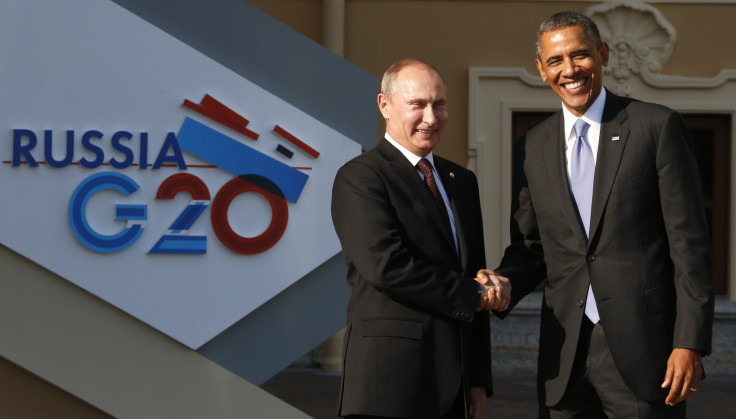Did Vladimir Putin Really Invade Crimea Because He Perceives Barack Obama As 'Weak' On Foreign Policy?

Why did Russian President Vladimir Putin invade the Crimea region of Ukraine? Scholars suggest there are a multitude of complicated explanations, from historical and economic to geographic, demographic, and generational. They also caution that as in most complex situations, no one explanation in isolation is entirely satisfying.
If you listen to the chatter among many of the pundits and politicians in the popular media, however, you get a very different picture. Far from complicated, the reasons are straightforward and easy to understand. In their estimation, Russia invaded because they see U.S. President Barack Obama as a weak and ineffective leader – someone who doesn’t have the will, backbone, strength, or fortitude to follow through on his threats or promises.
Shortly after the Russian military invasion of Crimea, for instance, Sen. Lindsey Graham (R-SC) said, “we have a weak and indecisive president that invites aggression.” Similarly, Rep. Michael Turner (R-OH) told Bloomberg News that “we’re projecting weakness” and Sen. John McCain (R-AZ) stated that Obama has “a feckless foreign policy where nobody believes in America’s strength anymore.” We heard similar comments from Rep. Mike Rogers (R-Mich), Chair of the House Intelligence Committee, Senator Marco Rubio (R-FL), former Sen. Jim DeMint (R-SC), and Rep. Tom Cotton (R-AK), among many others.
It isn’t only elected officials however. In a column, respected conservative commentator Charles Krauthammer asked whether Putin would “have lunged for Ukraine if he didn’t have such a clueless adversary?” Krauthammer concluded that while we can’t say for sure, “it certainly made Putin’s decision easier.”
Even David Gregory, host of NBC’s Meet the Press, raised the question of whether Obama’s weakness is responsible for the situation in Ukraine? “This is a conversation about Obama’s leadership, pure and simple,” Gregory noted. “This is a major test for whether the rest of the world, particularly bad actors, take him seriously when he says not to do something.”
The “Obama-weakness-is-to-blame” mantra continued on this, the second weekend of the crisis, as current and former officials visited the Sunday talk shows. Appearing on CBS’s Face the Nation, for instance, former Vice President Dick Cheney said there is “no question” that Putin “believes he [Obama] is weak.” He went on to note that the Obama administration has created an impression of “weakness” worldwide. Similarly, Sen. Ted Cruz (R-TX) told ABC’s This Week that Obama’s policy is to “coddle and appease our enemies. You better believe that Putin sees… in Syria [that] Obama draws a red line and ignores a red line.” And in an appearance on Fox News Sunday Sen. Rand Paul (R-KY) said the president “hasn’t projected enough strength.”
Over the last several years I have been critical of the Obama administration’s handling of foreign policy and a recent Fox News poll shows that I am not alone. In early March public approval of the president’s foreign policy fell to an all-time low of 33 percent (with 56 percent, or almost 6 in 10 Americans, disapproving).
Regardless of whether you approve or disapprove of the president’s handling of foreign policy, however, we should be clear that the suggestion his projection of weakness is primarily to blame for Putin’s actions in Ukraine is both unsubstantiated and ahistoric.
Almost everyone who has suggested that Obama is “feckless” would say the opposite about former president, George W. Bush and with good reason. Bush was widely criticized for being something of a “cowboy,” someone who would shoot first and ask questions later. Under his watch the United States intervened in two sovereign nations, including Afghanistan which in 2010 surpassed Vietnam as the longest war the US has ever been engaged in.
Few would accuse Bush of portraying weakness, yet that seems not to have mattered to Putin because in 2008 despite the president’s displays of strength, he marched right into a neighboring state. If Putin went into the Crimea region as a result of Obama’s weakness, what explains his actions in Georgia six years ago in the face of an arguably stronger President Bush?
Whether Putin senses that Obama is weak, the fact remains that Bush's show of strength did not stop him from entering a foreign state. The common denominator in 2008 and 2014 is that in both cases neither President Bush nor Obama would have been able to convince a war weary nation to commit troops to a foreign engagement.
Jeanne Zaino, Ph.D., is a professor of political science at Iona College and political campaign management at NYU-SCPS. You can follow her on twitter @jeannezaino
© Copyright IBTimes 2024. All rights reserved.





















